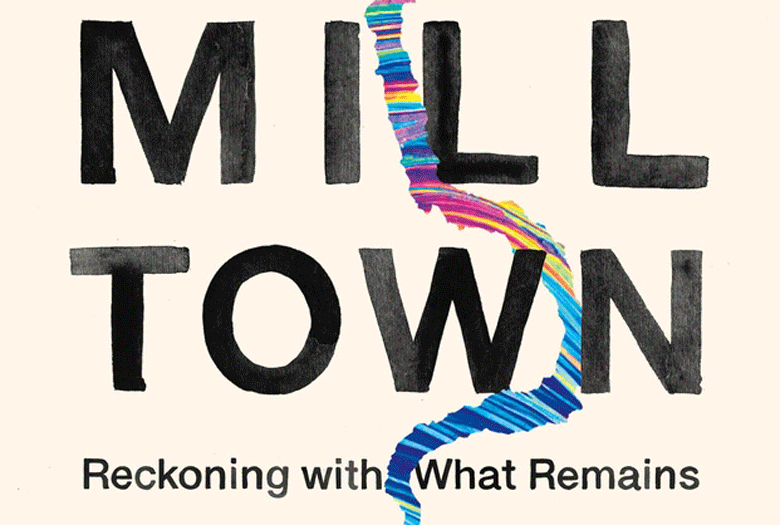Mill Town: Reckoning with What Remains
Kerri Arsenault (2020)
Review by Tina Cohen
Mill Town, with no specific location in its title, could refer to a lot of places. Here it refers to Rumford, where Arsenault grew up in the adjacent town of Mexico, across the Androscoggin River from the paper mill. The mill held central importance for everyone; when Arsenault was growing up, it was where both her father and grandfather worked.
As an adult returning to visit her family home, the devastating effect that dioxin, created by the mill, had on the health of the community and environment became chillingly clear to her. Dioxin is described as a “toxic byproduct of the chlorine paper-bleaching process and mill sludge waste incineration.” Dioxin’s notoriety includes being an Agent Orange ingredient as well the toxin in New York’s Love Canal.
Even when the Rumford area was dubbed “Cancer Valley” after a 1991 exposé on Boston television, most residents remained complacent. The mill provided incomes that allowed families a fragile financial stability. Arguably, those jobs were slowly sickening them, leaving them with a high incidence of a rare form of lymphoma, prostate and colon cancers, aplastic anemia, and lung disease.
The story has placed demands on her that feel unrelenting.
Arsenault’s father, diagnosed with asbestosis of the lungs after his retirement, ultimately died with esophageal and lung cancer. On her visits, Arsenault talks with Terry, the widow of Doc Martin, once Rumford’s primary physician. He had fought hard to convince federal and state agencies to investigate, but his pleading fell on deaf ears.
And Arsenault wonders, why didn’t the workers themselves express concern? She considers an attitude of “not rocking the boat.” Many in the two towns, including her family, had Acadian roots. She theorizes that their ancestors, forced from their homes and farmland by the English in the 1750s and expelled from Canada’s Maritime provinces, were eager to rebuild community life and obtain work. Once employed—many at mills like Rumford’s—they were grateful for what they had. Why jeopardize that?
Arsenault’s book is described as a memoir, and while it is a telling of her experience growing up in a mill town, it also broadens into a consideration of the power corporations have and its potential for abuse. And that is where Mill Town stops being about Rumford and has pertinence for all of us. She describes, for example, how Nestlé obtains water rights in Maine for what it bottles under various labels, including Poland Spring. It has even procured Rumford water to sell. She talks about unemployment and jobs moving away, poverty on the increase and growing opioid abuse.
Her writing can be jarringly poetic given the grim focus. Other times, the language is blunt and down to earth:
“In Maine, we clear-cut our forests while tourists exalt them. Pollution bankrupts
the fresh air we advertise. We let dioxins invade our environment, which end up
in lobsters tourists eat. We celebrate Thoreau’s voice but drown it out with the growl of chain saws. What gives our town life could also be what’s killing it.”
And because the narration is so personal, Arsenault allows her emotions into the telling. She is outraged, depressed, overwhelmed, angry, frustrated—as well as tenacious. The story has placed demands on her that feel unrelenting.
That crush of reality becomes the reader’s plight as well. There is little to feel heartened by, except that Arsenault has been able to write a compelling story we can learn from and ideally take as motivation to pay more attention ourselves.
Just as I finished this book, I read news describing pollution by another paper mill in Maine, this time at Old Town on the Penobscot River.
In October 2020, more than 30,000 gallons of pulping chemicals leaked over six days. While an effluent permit allows the mill to discharge some of its production waste into the river, unlicensed chemical discharge violates state and federal laws.
That mill is owned by a Chinese conglomerate, Nine Dragons, or ND, also the newest owner of the mill in Rumford. The paper pulp from Old Town is exported to China for use in production of cardboard. For the 130 new jobs, all non-union, 1,200 applied.
At its opening ceremonies, Sen. Angus King saluted the mill’s revival by ND, saying: “The paper industry in Maine is coming back. Why is this important to Maine? Because trees are what we’ve got.”
I winced a bit at that. Wouldn’t Maine’s most important resource be a healthy environment? Arsenault might say that expectation seems drowned out by the growl of chain saws. Or drowned in Maine’s waters the mills are allowed to pollute.
Tina Cohen is a seasonal resident of Vinalhaven.





